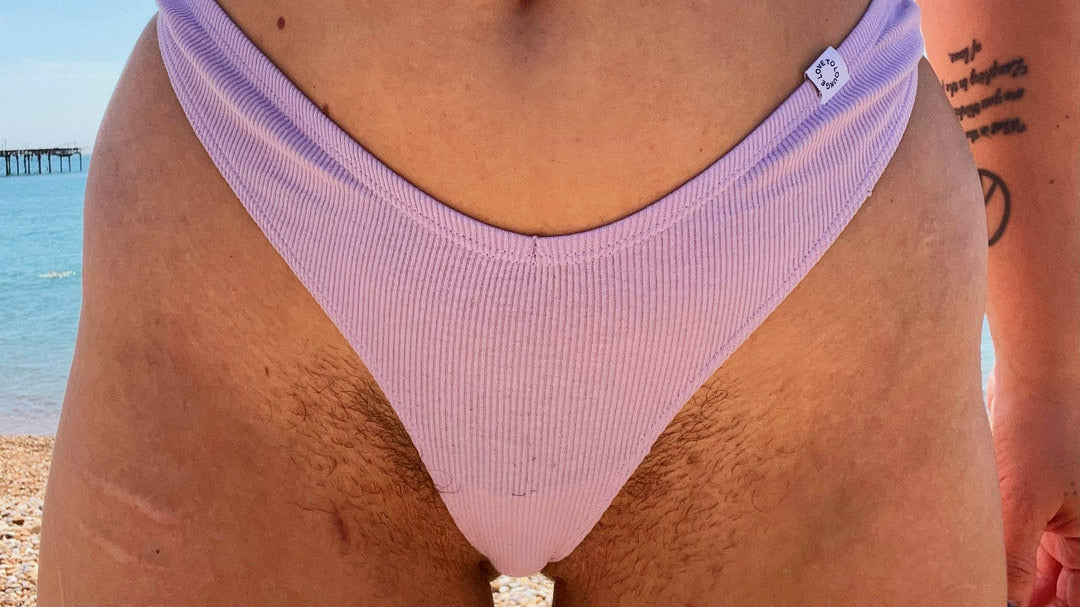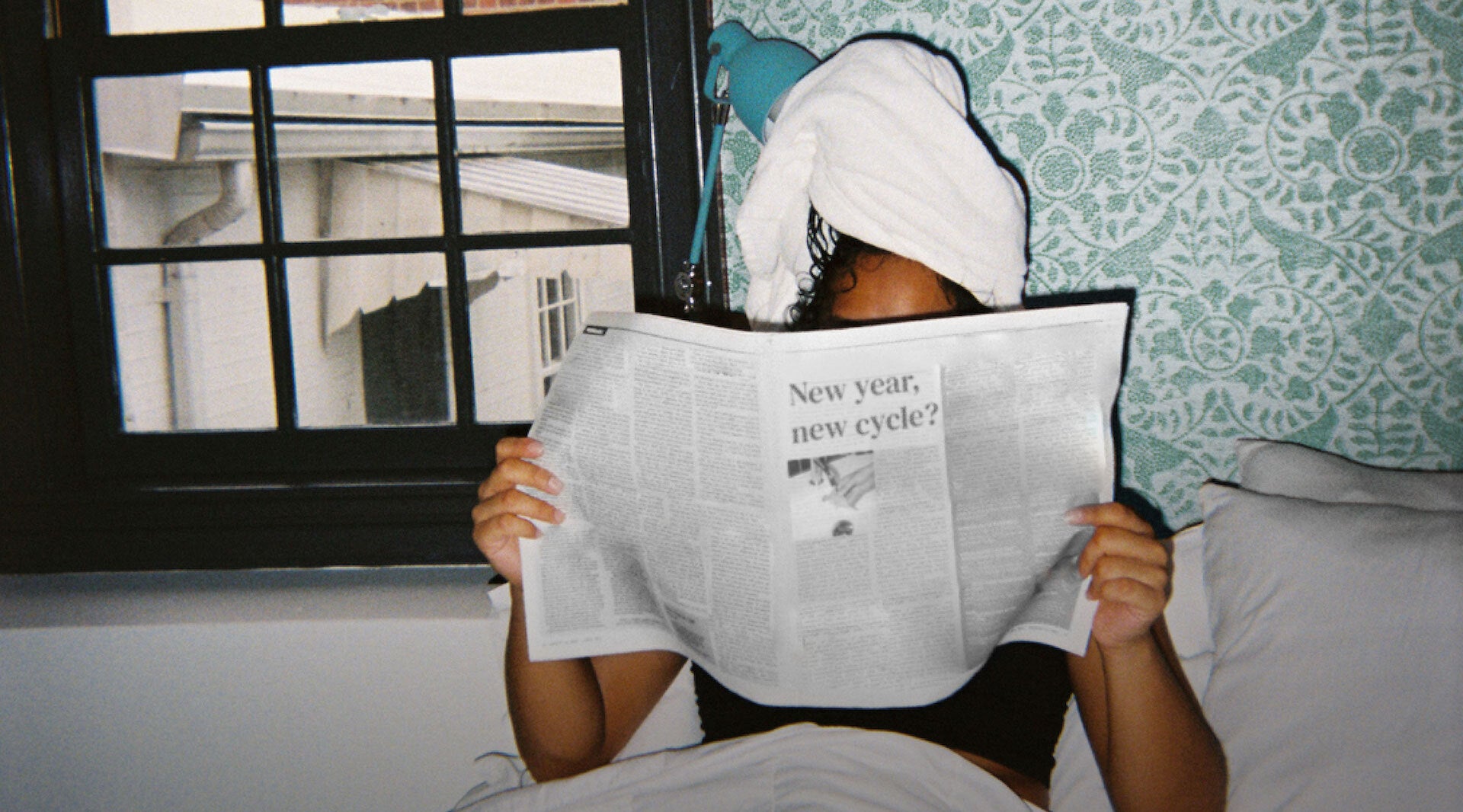Bush. Carpet. Short and curlies. Muff. Fluff. Fuzz. No matter what you call them, pubes (otherwise known as pubic hair) are a furry point of contention for most of us at some point in our lives!
Like many things to do with our bodies, the world has lots of opinions about how our pubes should look, and what we should do to fit in with the ‘norm’. But *newsflash*, like with a lot of this stuff, there is no one ‘normal’ way to be.
Pubes naturally come in many different shapes and sizes. And you can also choose to groom them into many different shapes and sizes, if that’s what tickles your fancy! Pubes aren’t just a cosmetic conundrum, they’re a functional part of our bodies. It’s important to take care of them regardless of how you choose to groom them.
So, join me below to learn all things pubes and answer some of your burning questions.
What is pubic hair?
Pubic hair is the hair that grows on and around the genitals. So, depending on your body, the vulva, penis, scrotum, and anus.
Pubic hair generally starts to develop around puberty, in response to changing hormone levels. At first, the soft downy hair that grows all over our bodies will start to get a bit thicker around the genitals. Over time it will become darker and coarser, and spread across a bigger area. It can take years from first noticing pubic hair to it becoming fully developed.
What is the purpose of pubic hair?
There are lots of different theories as to why we have pubes, which include:
Acting as a barrier
Like the hair in your nose, this theory suggests that the hair around your genitals is designed to act as a barrier. It is stopping unwanted bacteria and dirt from entering your body.
Reducing friction
The idea here is that pubic hair will act as a cushion to prevent friction during movement, like when having sex or exercising. This avoids the area becoming irritated.
As a sign of sexual maturity
Pubic hair develops during puberty when the body is also reaching sexual maturity. This theory suggests that pubic hair is a sign to others that we are ready to procreate.
To trap pheromones
Pheromones are substances released by the body that can’t be seen or smelt, but which send chemical messages to other members of a species. Pheromones play a part in attracting a mate. This theory believes that in humans, pheromones become trapped in pubic hair, allowing them to stick around for longer.
To keep you warm
It is also thought that pubic hair may help to keep your genitals warm and regulate your temperature, like a bespoke blanket!
A short (and curly) history of pubic hair removal
Removal of body hair has been around for thousands of years. Women in ancient Egypt removed body hair with razors, tweezers, and early waxing techniques. The upper classes in ancient Rome removed hair to show their status, using tweezers, razors, pumice stones and depilatory creams. Basically, people have been at it with the hair removal on and off for centuries. But removing the pubes only became popular in the west in the last hundred years or so. And it grew even more common when fashion become more revealing.
The first razor designed specifically for women came out in 1915, and as they say, the rest is history. Waxing became more popular, and with time, hair removal spread further across the body. In the 60’s and 70’s, the sexual revolution led to a resurgence in people rocking a full bush, but it didn’t last for long. In the 80’s, 90’s and 00’s waxing gained in popularity with many people opting for a Brazilian (with a little landing strip of hair left behind) or a Hollywood (going totally bare).
Recent years have seen more people letting their body hair grow out. The body hair positivity movement and campaigns encouraging people not to feel ashamed of their hair are on the rise. Being forced to spend a lot of time indoors during the pandemic has also allowed lots of people to try growing out their body hair. Away from the glare of the world, many found they like it.
Why do people remove their pubic hair?
There are many different reasons why people choose to remove their pubic hair. For most people it will come down to a combination of things:
Thinking its unhygienic
Many people perceive pubic hair as being unhygienic or unclean. This is not true! There is nothing unhygienic about pubic hair. This is a learned belief that has no basis in reality. After all it’s the same type of hair men’s bodies are covered in.
Like the hair on your head, you just need to wash it regularly to keep it clean. The only thing to bear in mind is that all body hair can sometimes trap dirt or smells. So, if for example you do a particularly sweaty workout, your pubic hair will likely need a wash, as will the rest of your body. More on how best to clean your pubic hair further down.
Societal norms
A lot of people choose to remove their pubic hair because this is the societal ‘norm’. We don’t generally see hairy bodies on screen or in the media. Even most shaving ads feature people who are already hairless, teaching us that visible body hair isn’t normal. The prevalence of porn and how accessible it is to young people is also likely fuelling the belief that we should all be hairless down there. But let’s be real, ‘normal’ is a very subjective term and we’re all different!
Partner preference
Removing all or some of your pubic hair because it’s what you think or know your partner prefers, is also very common. It’s worth bearing in mind that what your partner prefers has also been impacted by what they feel the societal norm is.
Sadly, there really is no getting away from the whole ‘but it’s what everyone else is doing’ thing in life! Ultimately, if you prefer different things, it’s up to you whether you choose to please them or yourself. Just make sure you’re never being pressured into something you don’t want or don’t feel comfortable with. Your pubes, your preference!
Personal preference
Honestly, this really is the most important consideration when deciding whether to groom your pubic hair or not. Whether it’s a visual thing, or all about the sensation, some people just like removing their pubic hair for themselves. For others, a full bush is more their jam. And of course, everything in between!
To bush, or not to bush? Should I remove my pubic hair?
There are no specific health reasons to remove your pubic hair, with some health professionals actively advising against it. Removing your pubic hair can in fact cause some minor health issues so it’s worth considering this before you go for the chop.
Ultimately, deciding whether or not to remove some or all of your pubic hair is totally up to YOU. Take some time to think about what you like. Remember that you can change your mind, it grows back after all!
What side effects might I get from pubic hair removal?
Injuries
Unsurprisingly, it’s quite common to accidentally injure yourself during hair removal. Our genitals are sensitive areas and not completely smooth flat surfaces. So, it’s not a shocker that most people will injure themselves at some point during pubic hair removal. These injuries can include cutting or nicking your skin when shaving and burns from chemical hair removers or waxing.
Skin irritation/rash
A lot of people will experience red and inflamed skin after shaving or removing their pubic hair. It isn’t really surprising, given that we’re either running a blade over our skin, burning the hair or ripping it out! For most people the rash will die down quickly but for some with sensitive skin it may last longer.
Ingrown hairs after shaving
Ingrown hairs are hairs that have curled over and grown back into the skin. They become trapped, rather than pushing through and onto the surface where you can usually see them. Ingrown hairs will normally cause a bump on the skin which may become red and itchy. In some cases, ingrown hairs can become infected.
Our top pubic hair removal tips. For if you choose to do so!
The decision on whether or not to remove your pubes is, like everything else to do with your body, totally up to you! Many people are enjoying the full bush experience but others still prefer to remove some of their pubic hair – the world is your oyster.
If you’ve made the decision to remove your pubes, but are wondering how to shave down there or if there is a ‘best way’, here are some handy pubic hair removal tips
- Trimming with scissors – if you decide to trim your pubic hair with scissors, the key message here is to BE CAREFUL! Scissors and genitals are not natural friends. Make sure you can clearly see what you’re doing with a mirror and a light and proceed with caution.
- Wash first – make sure you wash your pubes (and hands) before shaving or waxing. This will reduce the risk of bacteria getting into injured or inflamed skin.
- Exfoliate – exfoliating between hair removal sessions will remove dead skin cells and reduce the risk of ingrown hairs.
- Take care of your razor – use a sharp razor, make sure your keep your razor blade clean and change the blades regularly. Let your razor fully dry out between shaves and try to keep it like that. Razor blades dull with use, and a dull razor blade is more likely to nick the skin. Also, razor blades that have been in use for a while are more likely to harbour bacteria, which is why it’s important to change them often.
- Don’t dry shave – shaving without wetting the skin or using a shaving cream or gel is more likely to leave you with irritated skin, unless you have a product specifically designed for this. When shaving with an ordinary razor, it’s best to wet the hair and skin, then apply a shaving cream or gel.
- When waxing, inform yourself first – if you want to wax at home, make sure you know what you’re doing! Getting a professional wax isn’t necessarily better than doing it at home, just make sure you know how to use the product. If you’re not confident, it’s probably better to pay a professional the first time.
- Do a patch test – if you’re using hair removal cream always do a small patch test first to make sure your skin isn’t going to react badly to the product.
- Moisturise – after removing hair, applying moisturiser or an aftershave product can help soothe irritation. If you have a sensitive skin, make sure you’re using a gentle product.
- Let it breathe – skin is more sensitive after hair removal. If possible, try and wear loose fitting clothing for a few days after removing pubic hair.
Tips for pubic hair cleaning
If you still have all or some of your pubic hair, keep it clean by washing regularly with mild soap and water. There is no need to wash more frequently than once a day. Too much washing will potentially wash away good bacteria that keeps you healthy. Also, don’t douche (wash inside your vagina). This can also wash away good bacteria and will affect the normal healthy environment inside.
Common conditions that affect the pubes and the area around them
There are a number of conditions related to pubic hair and the area around it:
Infection
There is some suggestion that because removing our pubic hair causes irritation, it can leave us more susceptible to some infections. For those people who already have a history of herpes or genital warts, removing pubic hair may also leave you more prone to an outbreak.
Folliculitis
Folliculitis is a specific infection that occurs in the base of hair follicles. One common cause of folliculitis, is an ingrown hair that becomes infected. Shaving or hair removal can also lead to folliculitis as the skin can become irritated and bacteria can be introduced.
Folliculitis can be painful, and you may notice pus within the spot where the hair is. For many people this will clear on its own, but some may need to seek medical treatment. If you have concerns, speak to your doctor.
Pubic lice (also known as crabs)
Pubic lice or crabs are a common sexually transmitted condition. They are very small insects that live on body hair but are particularly found in the hair around the genitals.
Pubic lice are generally passed on through close contact with someone who already has them, usually through sex. They can also be spread by sharing things like towels and clothes. They are microscopic (2mm long) and look grey-brown in colour. Because they are incredibly small, they are very hard to see, but you may occasionally notice them.
Symptoms of pubic lice can take up to three weeks to develop after being exposed. Symptoms include:
- Itching in the affected area, which generally gets worse at night
- Bites from the lice, which will appear as small red or blue spots in the area
- Lice eggs, which will look like white or yellow dots on the hair shaft
- Lice droppings, which will appear as dark brown or black powder on your skin or underwear
- You may also notice spots of dried blood in the area if you’ve been scratching
If you think you have pubic lice, book an appointment with your doctor or sexual health clinic to get their opinion. If you are diagnosed with having pubic lice, the treatment is generally a medicated shampoo or cream. Once you have pubic lice, removing your pubic hair won’t necessarily get rid of them. They may just move to another part of your body, so this isn’t a recommended treatment.
If it’s likely the lice were passed on to you during sex, they may also ask about your recent sexual partners so that they can be contacted and treated too if needs be.
There we have it, pubes aren’t going extinct like the dodo, they’re alive and well and living in many people’s pants.
There is no right or wrong answer when it comes to hair removal. You just have to follow your gut and do what feels right for you – remember you can also always change your mind later. We should celebrate our pubes in all their varied shapes and sizes. And as ever, be grateful for our sometimes hairy, sometimes messy, always wonderful, bodies.
Blog disclaimer
Our blog is intended to share information and ideas around periods, health, and sustainability. While we do our best to keep content accurate and up to date, things can change over time. The information here is not intended as medical advice — for any health-related concerns, please consult a qualified healthcare professional. For more information on our claims, please see our Claims Page, and for the most up-to-date product information, please visit our Product Pages.





